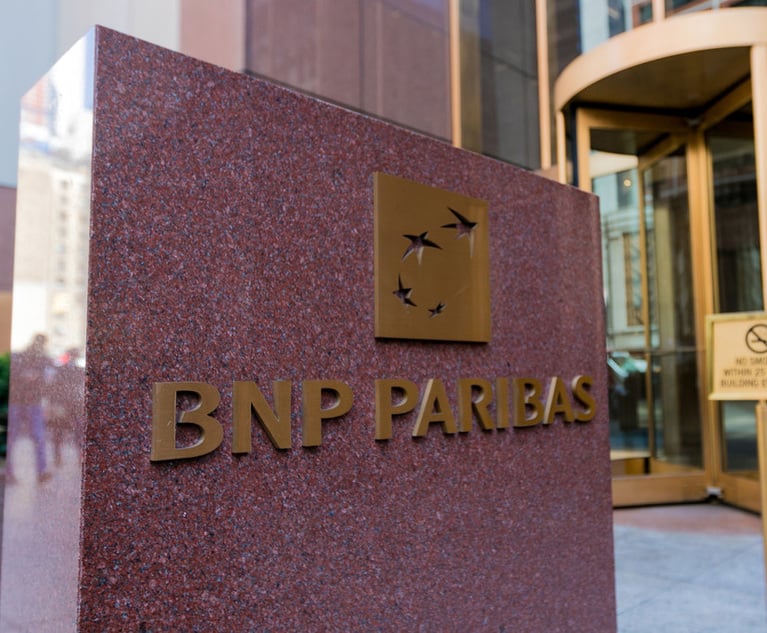Dual Uses—Can the MUFG Consent Order Vindicate the OCC's License Process?
The Feb. 21, 2019 OCC Consent Order with MUFG branch banks had two purposes. The commonplace one was to resolve a looming cease and desist action around anti-money laundering issues with the traditional comprehensive regulatory menu of action plans, risk assessments, due diligence prescriptions, transaction monitoring and auditing improvements.
March 14, 2019 at 02:00 PM
4 minute read
 Robert M. Axelrod
Robert M. Axelrod
The Feb. 21, 2019 OCC Consent Order with MUFG branch banks had two purposes. The commonplace one was to resolve a looming cease and desist action around anti-money laundering issues with the traditional comprehensive regulatory menu of action plans, risk assessments, due diligence prescriptions, transaction monitoring and auditing improvements. The unusual other purpose was for it to be filed by the OCC (as amicus) in the pending (2017) action between MUFG and the New York State Department of Financial Services (DFS). In that action, MUFG sought to prevent DFS from continuing to supervise MUFG after MUFG switched its banking license to the OCC, and the DFS complained that OCC had made an abrupt, improvident and meretricious license transfer decision. The OCC defended itself, in an amicus brief, as having gone through its usual processes, while the DFS contended in its answer and counterclaims (Answer) that it was about to bring its own enforcement action and that MUFG switched regulators to get an easier hand. The context of the prior action was further elaborated upon in my Sept. 11, 2018 article in this journal.
The new Consent Order, read in the context of the pending action, turns out to have been serendipitously tailored to a number of key arguments. The DFS accused the OCC of allowing MUFG to avoid the pending DFS consent orders from 2013 and 2014. The Consent Order recites (at pp. 1-2) that it continues to enforce the substance of those DFS orders through another order that MUFG consented to with the OCC in 2017 at the time of the license conversion. It further lists the occasion of the new OCC enforcement as “BSA/AML deficiencies that were not addressed in the NYDFS Orders,” (p. 2), as though to say that the OCC was in this instance tougher than the DFS. The DFS had also asserted that it retained supervision of pre-conversion activity, while the OCC said it could and would address pre-conversion wrongdoing. The Consent Order specifically recites MUFG's failure to timely far SARs in 2016, the year before the license conversion. (Id.) Another of the DFS complaints was that MUFG had fired a compliance officer who was cooperating with the DFS. While the Consent Order doesn't touch that directly, it does contain a standard section (Article V) requiring adequate resourcing, staffing and functionality of the compliance department. Finally, the Consent Order has a stringent provision (Article IX) around improving the internal audit function, a matter unmentioned in the previous DFS orders, but, for an ostensibly (from the DFS arguments) recalcitrant bank, an obvious point of remediation that DFS did not pursue.
Perhaps almost as interesting and a bit ironic is what is not found in the Consent Order. The DFS argument raised the question of whether the OCC could address violation of state laws, and the OCC claimed that it could and would do so as appropriate. The flashiest state law (or at least issue of state concern) implicit in the pending action pleadings, is the (DFS) alleged deceit of MUFG with the DFS during its state supervision. (Answer at pars. 42, 74 and 88 et seq.) The Consent Order does not surface such an issue. However, federal (as opposed to state) prosecutors are reportedly conducting a criminal investigation on the subject. The circumstances around the action comprise an object lesson in the murkiness of federal/state interactions in banking.
On the same day the OCC announced the Consent Order, the OCC also filed it with the Southern District of New York in the pending action between the DFS and MUFG. MUFG's motion to dismiss DFS's claims has been fully briefed since June, 2018, and awaits decision. The DFS agreed to withhold its asserted continuing supervisory power as an interim matter.
Robert Axelrod, a graduate of the University of Chicago Law School, is a financial services consultant in the New York City area.
This content has been archived. It is available through our partners, LexisNexis® and Bloomberg Law.
To view this content, please continue to their sites.
Not a Lexis Subscriber?
Subscribe Now
Not a Bloomberg Law Subscriber?
Subscribe Now
NOT FOR REPRINT
© 2025 ALM Global, LLC, All Rights Reserved. Request academic re-use from www.copyright.com. All other uses, submit a request to [email protected]. For more information visit Asset & Logo Licensing.
You Might Like
View All
'Merciless' Filing Deadline Dooms Cuban Americans' Property-Trafficking Suit Against BNP Paribas, SocGen
4 minute read
Class Certification, Cash-Sweep Cases Among Securities Litigation Trends to Watch in 2025
6 minute read
After 2024's Regulatory Tsunami, Financial Services Firms Hope Storm Clouds Break

GC Pleads Guilty to Embezzling $7.4 Million From 3 Banks
Trending Stories
Who Got The Work
Michael G. Bongiorno, Andrew Scott Dulberg and Elizabeth E. Driscoll from Wilmer Cutler Pickering Hale and Dorr have stepped in to represent Symbotic Inc., an A.I.-enabled technology platform that focuses on increasing supply chain efficiency, and other defendants in a pending shareholder derivative lawsuit. The case, filed Oct. 2 in Massachusetts District Court by the Brown Law Firm on behalf of Stephen Austen, accuses certain officers and directors of misleading investors in regard to Symbotic's potential for margin growth by failing to disclose that the company was not equipped to timely deploy its systems or manage expenses through project delays. The case, assigned to U.S. District Judge Nathaniel M. Gorton, is 1:24-cv-12522, Austen v. Cohen et al.
Who Got The Work
Edmund Polubinski and Marie Killmond of Davis Polk & Wardwell have entered appearances for data platform software development company MongoDB and other defendants in a pending shareholder derivative lawsuit. The action, filed Oct. 7 in New York Southern District Court by the Brown Law Firm, accuses the company's directors and/or officers of falsely expressing confidence in the company’s restructuring of its sales incentive plan and downplaying the severity of decreases in its upfront commitments. The case is 1:24-cv-07594, Roy v. Ittycheria et al.
Who Got The Work
Amy O. Bruchs and Kurt F. Ellison of Michael Best & Friedrich have entered appearances for Epic Systems Corp. in a pending employment discrimination lawsuit. The suit was filed Sept. 7 in Wisconsin Western District Court by Levine Eisberner LLC and Siri & Glimstad on behalf of a project manager who claims that he was wrongfully terminated after applying for a religious exemption to the defendant's COVID-19 vaccine mandate. The case, assigned to U.S. Magistrate Judge Anita Marie Boor, is 3:24-cv-00630, Secker, Nathan v. Epic Systems Corporation.
Who Got The Work
David X. Sullivan, Thomas J. Finn and Gregory A. Hall from McCarter & English have entered appearances for Sunrun Installation Services in a pending civil rights lawsuit. The complaint was filed Sept. 4 in Connecticut District Court by attorney Robert M. Berke on behalf of former employee George Edward Steins, who was arrested and charged with employing an unregistered home improvement salesperson. The complaint alleges that had Sunrun informed the Connecticut Department of Consumer Protection that the plaintiff's employment had ended in 2017 and that he no longer held Sunrun's home improvement contractor license, he would not have been hit with charges, which were dismissed in May 2024. The case, assigned to U.S. District Judge Jeffrey A. Meyer, is 3:24-cv-01423, Steins v. Sunrun, Inc. et al.
Who Got The Work
Greenberg Traurig shareholder Joshua L. Raskin has entered an appearance for boohoo.com UK Ltd. in a pending patent infringement lawsuit. The suit, filed Sept. 3 in Texas Eastern District Court by Rozier Hardt McDonough on behalf of Alto Dynamics, asserts five patents related to an online shopping platform. The case, assigned to U.S. District Judge Rodney Gilstrap, is 2:24-cv-00719, Alto Dynamics, LLC v. boohoo.com UK Limited.
Featured Firms
Law Offices of Gary Martin Hays & Associates, P.C.
(470) 294-1674
Law Offices of Mark E. Salomone
(857) 444-6468
Smith & Hassler
(713) 739-1250






